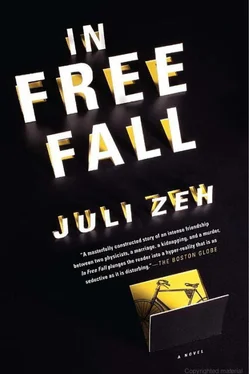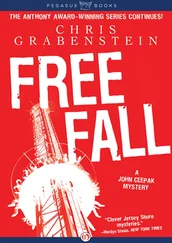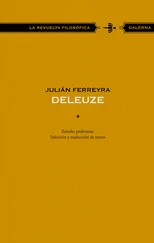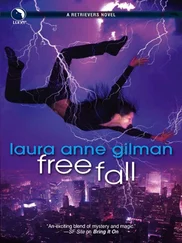“Detective,” Maike whispers, leaning toward him so that Liam cannot hear her, “did my husband murder Ralph Dabbelink?”
“Yes.”
“Thank you,” Maike says, and turns away. “It’s good to get a clear answer.”
“He didn’t want to.”
“No one does anything they don’t want to do.”
“He was blackmailed.”
“You believe him?”
“Strange, isn’t it? And you’re the one who’s married to him, not me.”
“What I believe doesn’t matter anymore.”
“You’re wrong there, too.”
The detective shifts a little in order to look at Maike in profile. She is not smiling. She also shows no despair, no anger, no pain. She’s a statue, Schilf thinks. Cold inside, outside pure form.
“Imagine three people walking along a beautiful road together,” Maike says. “The road suddenly comes to an end. And one of them beats his way into the bushes and runs off without hesitation. Alone.”
“That image is completely wrong.”
“Could you stop blathering?” a woman standing next to Maike asks.
“Almost done,” Schilf says, lifting his police badge up into view.
“Quantum physics opens up our thinking to an entirely different reality,” the announcer says.
“Everything I’m doing is aimed at proving Sebastian’s innocence,” the detective says to Maike. “And what’s more, to you .”
“Why?”
“I want you to stand by him.”
“Why?”
Because you belong on the postcard that I want to put on the fridge door of my memory, Schilf thinks.
He rubs both hands over his face. He is prolonging this conversation because he likes talking to this woman so much. He has to pull himself together and stop looking at her cloud of hair and her almost white eyelashes. He must make use of the seconds in which she is still listening, her arms crossed and her smooth face turned up toward the dome.
“Listen,” Schilf whispers. “Give me twenty-four hours and I’ll be able to explain everything to you. But I want the real guilty party to do that.”
“This is not my battle. I was cast aside before it began.”
“But Liam wants to know the truth. I promised him the truth.”
Maike glances at him, leans down to her son, and puts a hand on the back of his neck.
“Liam,” she says quietly, “do you still want this man to tell you anything?”
Liam looks over his shoulder and catches the detective’s eye.
“Get lost,” he says.
Schilf buckles as if he has been hit in the stomach. He turns the collar of his jacket up and presses the briefcase to his side.
“Our reality is like the smile of a cat that does not even exist,” the voice from the loudspeakers says.
As the detective wends his away through the crowd, he feels his nose, his mouth, and his ears as if he were learning to recognize himself in the dark through his sense of touch.
“Pardon,” he whispers. “I’m going now.”
Again and again, as if he has to tell every one of the hissing spectators: “I’m going now.”
THE BRIEFCASE MAKES IT DIFFICULT TO RUN. Schilf wedges it under his arm as he runs past the station and onto Stephan-Mayer-Strasse. The entire city seems to be fired up by his exertion. Passersby turn into multicolored streaks and buildings hold in their stomachs and lean forward to watch him hurry past. A boy runs alongside him for a while, shouting, “Giddy-up! Giddy-up!,” and clapping his hands. It is only when Schilf reaches Sophie-de-la-Roche-Strasse that he slows down. His heart is pounding hard against his ribs. Beneath his feet the ground breathes, the pavement rises steeply heavenward. The detective half expects that he will turn into a murky fluid at any minute.
Bonnie and Clyde drop from the wall into the water and glide toward him, tugging a ripple behind them.
“Quick, quick, quick,” they quack.
Schilf cannot speak, but raises his hand to thank them before he enters the building.
The walls of the stairwell mimic his panting. Schilf pulls himself up by the handrail, step by step. He has not given any thought to how he will get the door to the apartment open in case of emergency. When he gets to the second floor, the door is open. Schilf checks the lock; it is undamaged. Either his colleagues have made a very clean job of it or they were admitted voluntarily. In any case, the open door is no longer a technical problem, but an invitation.
Although Schilf first visited the apartment no more than two days ago, he has difficulty recognizing it even from where he stands in the doorway. Paper is strewn everywhere, the carpets have been rolled up, and the pictures taken off the wall. Everything gives the impression of forced departure and homelessness. Schilf does not have to think long about where to find Sebastian. Certain things always happen in the kitchen, which is the stomach of an apartment, just like the hallway is its legs, the living room its heart, and the study the convolutions of its brain.
All is still in the kitchen. The wire noose hanging from the ceiling casts a sharp shadow on the floor. The ceiling lamp has been removed and placed on top of the table like a suction cup. A chair had been knocked over and its legs are lying against the oven door. The contents of the drawers are scattered on the floor: cutlery lying between candles, string, plastic wrap, and cleaning cloths. Pots and pans are piled up on the windowsill. Sebastian’s body blends seamlessly into the picture. He is sitting at the table, motionless, bent over like a question mark, staring blankly at an empty glass decorated with a picture of two nuzzling parakeets.
“Goodness gracious,” the detective says.
He drops the briefcase and hurries over to Sebastian with both arms stretched out as if he is trying to take something heavy from him. Sebastian lifts his gaze, but does not quite manage to look the detective in the eye.
“Liam gave it to his mother for her birthday this year,” he says, lifting his finger ever so slightly to point at the glass. “We stumbled upon it in a department store. Maike was very pleased with it.”
“How lovely,” the detective says.
“I thought it would be easier. It was quite simple with Dabbelink. Steel cable is steel cable, I thought.”
“That is not just a bad solution,” Schilf replies. “It’s no solution at all.”
“Oskar once said that life is an offer that you can also refuse. But I wasn’t in a position to decide then. Same story my whole damn life.” Sebastian’s laugh turns into a coughing fit. “What brings you here?”
“I have a message for you.”
Sebastian finally raises his head.
“From Maike?”
“No.” Schilf clears his throat. “You’ll find out very soon who it’s from.”
An ambulance siren draws closer, grows louder, and shrieks a high-pitched warning. Its frequency decreases as the vehicle passes.
“The Doppler effect,” Sebastian says. “A great example of how everything is relative.”
Together, they listen to the sound ebbing away. Schilf feels like a surgeon who is allowing his patient a few moments of peace before he cuts away an abscess without anesthetic. This abscess is a mistake. It is the final, the biggest, and the most painful mistake that Schilf wants to cut out and replace with the steel instrument called truth, which will function as a sterile foreign body in the organism of the patient. The detective wishes an anesthetist were present.
“This is going to hurt for a bit,” he says. “Get ready.”
Sebastian looks at him, waiting.
“ Doublethink must go,” the detective says.
“What the…”
Sebastian starts to jump up, but sinks back into the chair when the detective places two heavy hands on his shoulders.
Читать дальше












